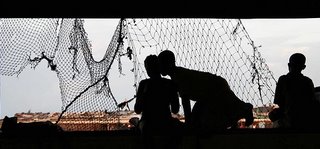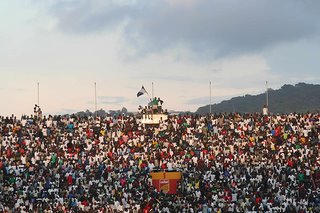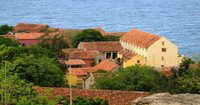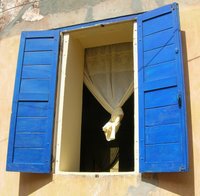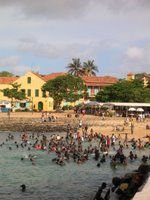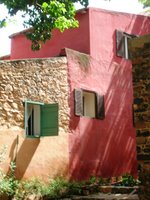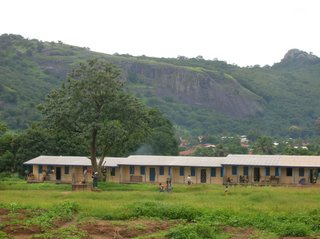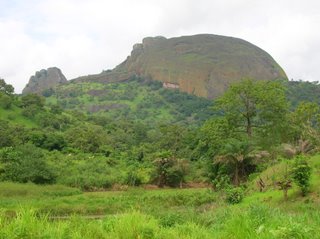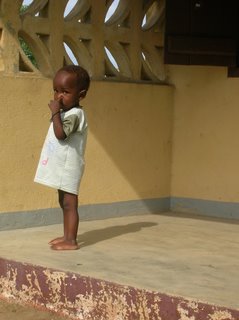The movie was pretty good. Hollywood-ized, of course, with the requisite love story and journey of self-discovery, but powerful and with a point. And yet, to paraphrase Connelly’s character, it may be enough to make some people cry and others write a check, but it won’t be enough to make it stop. People are still killing one another in brutal ways in places like Darfur and Somalia, and we’re doing virtually nothing about it. “Sierra Leone is now at peace” reads the screen at the end of the film, but there are still “200,000 child soldiers in Africa.”
Meanwhile, back in a now-peaceful Sierra Leone, the memories of the war are achingly fresh. Peace was finally declared (after more than a decade of fighting) less than 5 years ago. The rebel invasion of Freetown, depicted in the movie, happened just 8 years ago. On that day in 1999, hordes of drugged-up, frenzied young fighters murdered, raped, and brutalized their way across the capital city, where I now live and work. Though much has been rebuilt, the city still bears those scars – shelled walls, burnt-out buildings – and so do the people within.
I’ve found that many Sierra Leoneans are disarmingly quick to recount their experiences during the war (or at least to recount a version of those experiences, however selective). It often makes me uncomfortable, hearing someone speak so openly and easily of events too horrible for me to even imagine. It’s a coping mechanism, I suppose – and perhaps a healthier one than the kind of collective silence that you find in many places – but can be strange for the listener.
As an example, I was sitting around with my local research team a few weeks ago at our guest house near Tombo, a fishing village not far from Freetown. We were chatting after dinner about this and that, and at some point talk turned to the war. Or, more accurately, to jokes about the war.
Now these “jokes” were not in the least bit funny to me or to my German colleague Tanja; to us, they were simply terrible (and quite possibly true) stories from the war. But to my researchers, trying – with newly-minted college degrees, new jobs, and hopes for the future – to escape the past and the memories that surround it, these “jokes” were probably cathartic, and definitely hysterical.
Let me give you a few examples. Just as we might say “A rabbi and a priest walked into a bar,” one of the researchers began a joke with “The rebels walked into a mosque…”
The rebels walked into a mosque and said, “Who is the most holy man here?”
People said “Our Imam” and pointed to an old man in the corner.The Imam waved his hands and said “No no, I’m not the Imam.” The rebels said “Oh, because the Imam was the only person we were going to save.”
So the old man said “Wait, wait, I am the Imam,” to which the rebels replied, “Then you are the first man we will kill.”
Then they shot him.
Funny? The researchers thought so -- they laughed until they cried.
Or here’s another. Amputations were one of the more distinctive atrocities committed during the Sierra Leonean civil war. Men, women, and children alike were robbed of a hand, a foot, or multiple hands and feet, so their injuries could help spread terror of the Revolutionary United Front (RUF) rebels, or of the other fighting forces. The practice is depicted in Blood Diamond, where a brutal commander says he is taking people’s hands so they will be unable to vote, saying “The government says the future is in your hands, but we have your hands, and we are your future.” (or something like that)
Also portrayed in the movie, and well documented in reports on the war, is the terrible question asked of many amputees: whether they wanted “short sleeves or long sleeves” – meaning whether they wanted their hands cut off just above the wrist, or above the elbow. Well, the Sierra Leoneans had a joke about this too:
A man was led to the cotton tree and his arm placed across the root. The rebel held a machete above his arm and asked “short sleeves or long sleeves.”
The man said, “you’re the tailor, you tell me what would suit me.”
Huh.
Now I don’t want to portray my researchers – or other Sierra Leoneans – as the kind of people who find such brutality amusing. These are good, intelligent, hard-working young adults, who would no sooner cut off your hand than cut off their own. That is part of what made the whole evening so surreal for Tanja and I. We were not listening to hardened warriors joking around the fire about the day’s exploits, but to the light-hearted humor of “normal” young people.
But these “normal” young people are also people whose youths and childhoods – not to mention friends and loved ones – were stolen by 11 years of civil war, and who were lucky to escape with their lives. Humans forced to withstand the kind of horrors faced in 1990s Sierra Leone must find a way to deal with that trauma, and one way is through humor.
Another way is to move on. Last night, as I grappled with the incongruity of watching my adopted country be torn apart on the big screen while sitting in a movie theater in tranquil small-town Vermont, one of my Sierra Leonean friends was being married in Freetown. If I hadn’t come home for the holidays, I would have been there with him – dancing, laughing, and making new memories to erase the old.
Somehow, that seems the best way to move forward from a bloody past.


